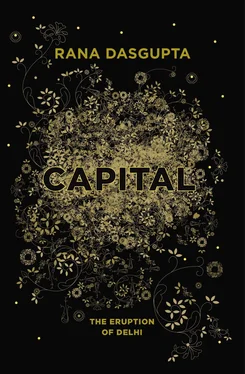“People are giving up their family business, moving out of their parents’ house and losing their values. I think it’s shameful. Why do you need to move out of your parents’ house? Are you Indian or not?”
Since I last saw Mickey he has moved, with his parents, into the enormous farmhouse he has been building for the last two years. I have never seen this place, but its scale and opulence have created waves of rumours I hear everywhere I go. The golfing carts for navigating the grounds. The underground swimming pool surrounded by bullet-proof glass panels on steel rollers. The interior decor of gold tiling, red velvet and crystal masterminded by a British nightclub designer
“And those people are idiots,” he continues, “because the opportunity is now. This is the time that money your family built up in the last generations can really explode. We’re approaching a global food crisis. The climate is changing and a lot of established food markets are having major problems. Look at Australia. There is so much scarcity. The next oil is food.”
He says it with exaltation, and I remember this feeling from my last conversation with him: that he is a businessman bred for the era of catastrophe, delighted by food shortages, climatic disturbance and turbulence of all sorts. Unlike American elites, who might have come to maturity in an age that believed that the future would be less assailed by catastrophe, Mickey comes to maturity in an age that believes that catastrophe is just beginning.
“Our next big venture in India is poultry. We’re looking to deliver 500,000 chickens per day. They’ll be properly packed and hygienic. Currently chicken farms are very dirty. The knife they cut with and the base they cut on are so dirty. We just have to tell people the knife they cut with is dirtier than your toilet seat and they’ll all abandon the old suppliers. This will be a very important product for us.”
He seems to have even more energy than the first time I met him. Any one of the many projects he is managing would defeat most other people I know. I say he must be working hard.
“Of course it’s difficult. I don’t get to see my kids. My wife goes on at me about it. I see them for half an hour in the morning and maybe two evenings a week. But I tell her — when they’re nineteen, at least they’ll have money. Imagine if we didn’t have money and they were complaining that they couldn’t go to good schools or anything. What would I say to them? ‘Well, at least I spent time with you’?”
It is time for Mickey’s massage.
“It’s a great time,” he says, rising, “the greatest time ever in Indian history. There’s money to be made in every corner. Everywhere you look there’s scarcity. It’s very corrupt — you have to work very hard — but it’s a great scene.”
“Would you like it to be less corrupt?” I ask.
“ No! ” He laughs at length, and turns to his friend in mirth.
We walk out through the hotel. He and his friend head towards the spa. We say goodbye and I walk away. He calls out to me.
“And by the way!”
I turn around.
“I still want to buy Heinz!”
• • •
Driving past Delhi’s sole dealer of Bentleys and Lamborghinis, I stop in on a whim and ask to speak to the manager. He’s not around and I’m sent to have coffee with the PR girls. They are appropriately attractive and, judging by their diamonds, from the right kind of family. (“I’ve driven a million Porsches and Ferraris,” says one. “They’re nice cars. But when you get into a Lamborghini, it’s something else.”) For them, Delhi is a place of infinite money-making, and they fall over themselves trying to express this fantastic fecundity.
“When someone comes in here looking to buy a Bentley, we don’t ask him what he’s driving now. Just because he drives a BMW doesn’t mean he can afford a Bentley. We ask if he has a jet or a yacht. We ask if he has an island.”
“Are there many people with jets in Delhi?” I ask.
The girls wax apoplectic.
“ Everyone has one. And not just one — they have two, three, four.”
We chat about nice cars and expensive living. A Lamborghini is driven into the showroom: the noise is so deafening that we have to stop talking until it’s in place. I ask the philistine’s question: what’s the point of spending 30 million rupees [$600,000] on a car that can do over 300 kilometres per hour in a city where the traffic doesn’t move? They tell me about the car club that meets at night in the diplomatic enclave, where the roads are straight, wide and empty.
“You have to have at least, like, a BMW or a Mercedes to join. They meet at midnight and they race their cars. The prime minister’s office is always calling us to complain.”
“Why?”
“Because the prime minister can’t sleep. These engines make so much noise they keep him awake. So he calls us to complain, but obviously there’s nothing we can do.”
As I drive away, I cannot help thinking of prime minister Manmohan Singh tossing and turning in bed, his snowy hair unturbaned on the pillow, his dreams interrupted by the rich boys’ Ferraris screaming up and down the roads outside. Manmohan Singh is of course the man who, long ago, as finance minister, opened the window to the storm of global capitalism and set the course for a new oligarchic elite.
You like this table? I designed it myself. Brilliant white. If anyone comes in to the room unexpectedly they’ll never be able to spot the cocaine on it.
— Delhi millionaire
“Parties in Delhi are no fun, dude! In Mumbai, even when they’re doing coke it’s fun to be with them. Here it’s not like that. In Delhi people are crazy, and they go to parties to escape themselves because fundamentally their shit is fucked up. When you go into it with that mentality, you’re heading for some morose shit. You go to Delhi parties, and you see two sitting in that corner, three in that corner, four smoking outside. No one’s talking. It’s like that here.”
I’m speaking to Krish, who, as a retired drug dealer, knows something about all this.
“I started out dealing in Goa and Manali but I quickly got connected to the cities. If any party happened in Delhi, I used to be there. Nothing works without drugs in Delhi, so without me there was no party. Without me, there was no Fashion Week. When Fashion Week happened, they called me up to make sure I was coming, and they booked me a room in the hotel where it was happening. Any designer who was having a show would call me before to say, ‘Dude, you have to be there on that day.’ For Fashion Week you needed 100 or 200g easy in one or two days. I used to get everything. I was perfect. People used to trust me because I never messed up. I would just finish my job and walk away.
“Everyone is using, boss! Big politicians, big industrialists, fashion, media — all of them. But in Delhi you don’t see it out much: it happens in farmhouses. The people who do so much coke don’t go out. The farmhouse area is a fucking junkyard. I don’t care to go these days. Delhi used to be fun. Before 2001 we used to have rave parties in farmhouses. And it was fun, people wanted to listen to music, and the parties were outdoors. And yeah, all kinds of stuff used to be around but nobody used to do coke. Ecstasy or MDMA. Not cocaine. People loved each other and there were only a few people in the scene, they didn’t give a fuck what other people thought, they just wanted to dance. Now the parties are all shuttered up and no one cares about music. Everyone’s got their expensive clothes on, so they need air conditioning. You can’t do MDMA in a closed room, you know: you need to be outside dancing. You can’t fucking do it in a room and sit there. So coke is more convenient for people nowadays.
Читать дальше











